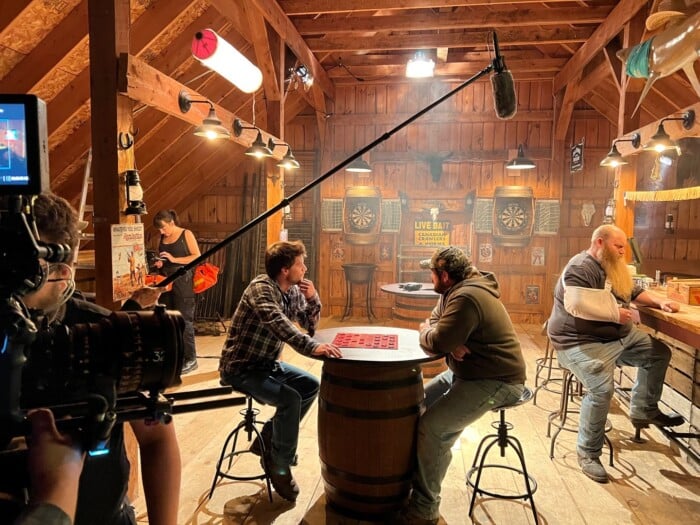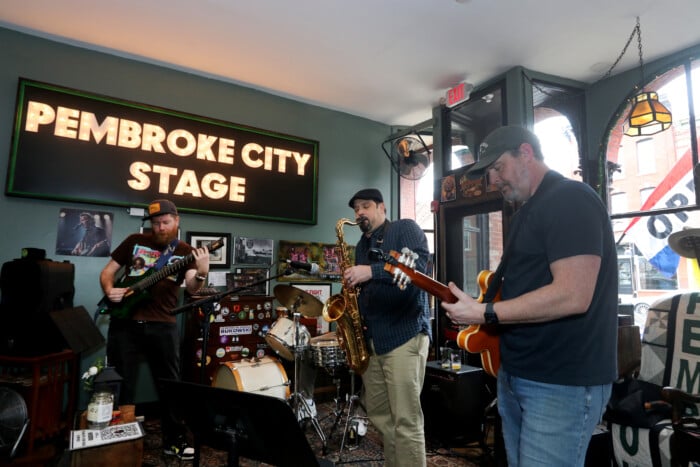Live Free and Film: Studio Lab’s Grassroots Campaign to Bring Film to NH
Reviving the NH Film Office could help bring Hollywood to the Granite State

Production still from short film “Mars Hill Bait and Ammo,” showing a scene in action on location in Rochester. Photo Credit:Stemwinder Studios LLC
New Hampshire is ready for its time on the silver screen. With its thriving arts community, diverse landscape and ease of accessibility, you would think that the Granite State would be a prime filming location for blockbuster movies.
That hasn’t been the case. In 2021, the New Hampshire Film Office was voted off the state’s budget, cementing New Hampshire as one of a handful of states with no way to market themselves as a filming location. A grassroots campaign, started by Tim Messina, owner of Studio Lab in Derry, and Carolyn Leary, Studio Lab’s director of business development, is looking to change that.
As professionals in the film and entertainment industry, the closing of New Hampshire’s Film Office was challenging. A state film office acts as a database of local talent, locations and professionals; when a filming location is being considered, producers and directors will go through the state film office to figure out how they can shoot there.
Producers want to know how accessible a location is, if there are any permits they need to apply for, and what talent (both on- and off-screen) is in the area already. The film office is also responsible for marketing their state. Representatives from the office will go to screenings and film festivals to attract business.

Production still of the New Hampshire Lottery filming a TV commercial at Studio Lab in Derry. Photo Credit: Studio Lab
With the New Hampshire Film Office out of the state budget, the New Hampshire film industry is essentially cut off from the rest of the industry, making it much harder for feature films and television shows to be shot here.
“We were all defeated,” Messina said. “We were told that if (the Film Office closing) happens, it would be almost impossible to bring back. We couldn’t just let this sit by the wayside, because our livelihood depends on this working.”
With no central office for industry professionals to connect, Messina decided to host Studio Lab’s first Industry Night. On the first Thursday of the month, Studio Lab hosts a gathering of anyone and everyone in the film and entertainment industry to give them a chance to connect with each other over a burger and a beer. It was there that the idea for Senate Bill 286 was born.
The bill proposes that the New Hampshire Film Office be reinstated with a least two staff members, rather than the one-person venture it was before. Within the new structure, an internal liaison would oversee the talent database, know which locations in New Hampshire would be a good fit for the project, and would help the filmmakers navigate permits and booking. The second person would focus on selling New Hampshire as a desirable filming location.
“This state is so rich with the natural landscape,” said Music Hall and New Hampshire Film Festival CEO Tina Sawtelle. “Even though we have a very small coastline, it’s very quaint and beautiful. As you traverse into our towns, you see these quintessential New England towns from the southern parts all the way up to the northern parts of our state.”
“Then there are the mountains, rivers, lakes and forests. Our natural resources are amazing. Then, when you start to talk with local filmmakers, they’re talking about our airports.”
In any movie or TV show with an airport scene, a major airport like Boston Logan is being used. With an immense amount of coordination, a terminal in that airport has to be booked and cleared for filming, and actors and crew members need to go through security in an already busy airport.

Industry Night, hosted by Studio Lab in Derry, is a monthly event meant for celebrating creativity, building community and connecting professionals and enthusiasts from the film and entertainment industry. It’s a relaxed gathering where people with a passion for innovation and
creativity come together to network, share ideas and have a good time. Photo Credit: Studio Lab
Smaller airports, like Manchester-Boston Regional Airport, can offer a less expensive, less chaotic day of filming, because their size gives them more flexibility. Plus, filming at a regional airport helps its economic growth.
SB 286 also proposes a filming tax incentive. While the details are still being ironed out, most states offer a tax incentive to encourage filming in their state.
New Hampshire is currently the only state in New England that doesn’t offer any tax incentive for filming, which is causing the state to be skipped over.
From an industry standpoint, Oscar-winning producer and New Hampshire native Chris Stinson knows that a tax incentive is vitally important to promoting filming in New Hampshire for large and local films.
“In a nutshell, it’s just a percentage back of what you’ve spent. Mass. has one of the better tax incentives, and it’s one of the easier ones to understand,” Stinson said. “It’s a real basic 25% of whatever you spend you can get back. Let’s say you spend $10 million. Your check back is for $2.5 million as a ‘thank you for coming.’”
Stinson also mentioned that a $100 million Apple TV series that he is working on passed over filming in New Hampshire to instead film a few scenes in Maine because of New Hampshire’s lack of film office and tax incentives.
“Had there been somebody to call, maybe part of that Apple series would be prepping locations in New Hampshire right now,” he said, “It’d be nice to have the option (to film in NH), but right now I don’t.”
While there are a lot of people in New Hampshire already working in the film industry, or looking to break into it, they must move elsewhere to work because they aren’t able to work here.
Messina is looking to change that through boosting filming in New Hampshire, and Stinson is onboard.
“I think about 19-year-old me who had to go to L.A. because there was nothing here. If there was more of an industry here, (younger generations) wouldn’t have to (move to New York or L.A.),” he said. “Maybe they’d be in an industry (here) that they really love and is thriving, which helps the local economy.”
New Hampshire’s film and entertainment industry isn’t the only one to benefit from an increase in filming.
“People are excited about how we can grow New Hampshire and make it a really exciting, vibrant place for people to want to stay, move to, raise their families in, keep their families here,” Leary said, “Film is definitely an opportunity to do that.”
Messina acknowledges that growth would be slow at first.

Production still of a Colossus agency virtual production shoot for Gray Whale Gin commercials that required photo-realistic California beach locations. Shot at Studio Lab in Derry. Photo Credit: Studio Lab
“But if there’s more economic things happening here in the film world, then there’s more opportunity for jobs and then infrastructure to be built,” he said.
Every production employs hundreds of people, beyond set-specific jobs and on-screen talent.
“Heck, you could be an EMT that needs to be on-site,” Messina said. “There are all these opportunities to be hired. My brother-in-law is a doctor, and he opened Rock Medical in Rock Lititz, Pennsylvania, to support the entertainment industry and all the people that were working there, because one company decided they were going to build this huge rehearsal complex where Taylor Swift and all the biggest artists in the world would rehearse.”
As the entertainment industry grew in that area, Messina’s brother-in-law wasn’t the only person to see their business flourish.
“All these external things started happening where other companies started moving closer, putting their roots there, including all these other things that were not directly related to that industry,” he said.
That includes filling needs for drivers and other support personnel.
“You need people, like what we have (at Studio Lab) and equipment, you need the actual roles that are on set, you need actors, all the things you can think of,” Messina said.
Supporters of the bill are optimistic that encouraging filming in New Hampshire will be all around good for the economy.
“This is not out of the realm of possibilities for our state,” Sawtelle said. “(It would) stimulate the economy across various towns and areas within our state. I think it’s an awesome opportunity for us.”
Fostering a homegrown film industry could help attract and retain the young people that New Hampshire so seriously lacks. Its population remains one of the oldest in the country.
A modest investment could pay big dividends over time, industry advocates say.
“This is easy money,” Stinson said. “And, it’s great for the younger generations, because they can have a good career, a good salary and not have to move away.”
As SB 286 works its way through the State House, New Hampshire’s filmmakers and industry professionals are eager for the future that the bill’s passing would bring.
They’re ready for New Hampshire to finally have its time in the limelight.
Read more about the work that Studio Lab is doing: www.studiolab.one
SB286 Update: After this issue was sent to press, SB286 was tabled in NH Senate, which essentially prevents it from moving forward. The bill was able to be moved to a study, which means there’s still hope for it yet. No matter what happens, the bill’s supporters will keep pushing, even if it’s a long journey!












